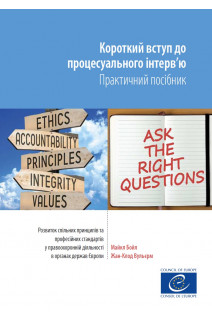Розвиток спільних принципів та професійних стандартів
Цей короткий вступний посібник розроблений за ініціативою Відділу з питань співробітництва у галузі кримінального права Ради Європи (DG1) та призначений насамперед як навчальний інструмент для співробітників поліції, які проводять процесуальні інтерв’ю, з особливим наголосом на інтерв’ю підозрюваних осіб. Його основоположна мета полягає в розвитку побудованих на дотриманні прав людини практик процесуального інтерв’ю як частини розслідування, з наголосом не лише на правових та моральних імперативах, але й на оперативній ефективності такого підходу.
Цей посібник наголошує на небезпеці цілковитого покладання на необґрунтовані визнання як на засіб розкриття злочинів; підкреслює критичну важливість збереження об’єктивності та презумпції невинуватості; надає докази ненадійності застосування репресивних засобів та катувань під час інтерв’ю підозрюваних осіб; містить практичні поради щодо постановки запитань до підозрюваних осіб, які з більшою вірогідністю дадуть змогу одержати реальну інформацію; надає співробітникам поліції засоби ефективного структурування та планування процесуальних інтерв’ю.
Promoting shared principles and professional standards in European policing
Initiated by the Criminal Law Cooperation Unit of the Council of Europe (DG1), this brief introductory guide is primarily designed as a training tool for police officers involved in interviewing, with particular reference to the interviewing of suspects. Its fundamental aim is to promote human rights compliant practices throughout the interview phase of investigations and in so doing underlines not only the legal and moral imperatives, but also the operational effectiveness of adopting such an approach.
The guide further highlights the dangers of relying solely on unsubstantiated confessions as a means of resolving cases; emphasises the critical importance of maintaining an open mind and the presumption of innocence; presents evidence for the unreliability of using oppressive means and torture in interviewing suspects; contains practical advice for questioning suspects in ways that are most likely to elicit actionable information; and provides officers with the means to structure and plan investigative interviews effectively.
ВСТУПНА ЧАСТИНА ПРОФЕСІЙНЕ ПРОЦЕСУАЛЬНЕ ІНТЕРВ’Ю
Інтерв’ю чи допит?
Виклики, пов’язані з дотриманням прав людини
Дотримання закону – обов’язок поліцейського
Права людини
Золоте правило
Катування не працює
Як поводитися з підозрюваною особою
Постановка запитань
Зчитування поведінки підозрюваної особи: пересторога
Докази вини
Аудіо- та відеозапис інтерв’ю
Визнання вини
Підозрювана особа, яка мовчить
Практична перевірка
ПРОЦЕС ІНТЕРВ’Ю
Планування
Підготовка
Вступна частина
Розповідь
Запитання
Завершення
Оцінювання
ЗАКЛЮЧНА ЧАСТИНА ПРИНЦИПИ ПРОЦЕСУАЛЬНОГО ІНТЕРВ’Ю




